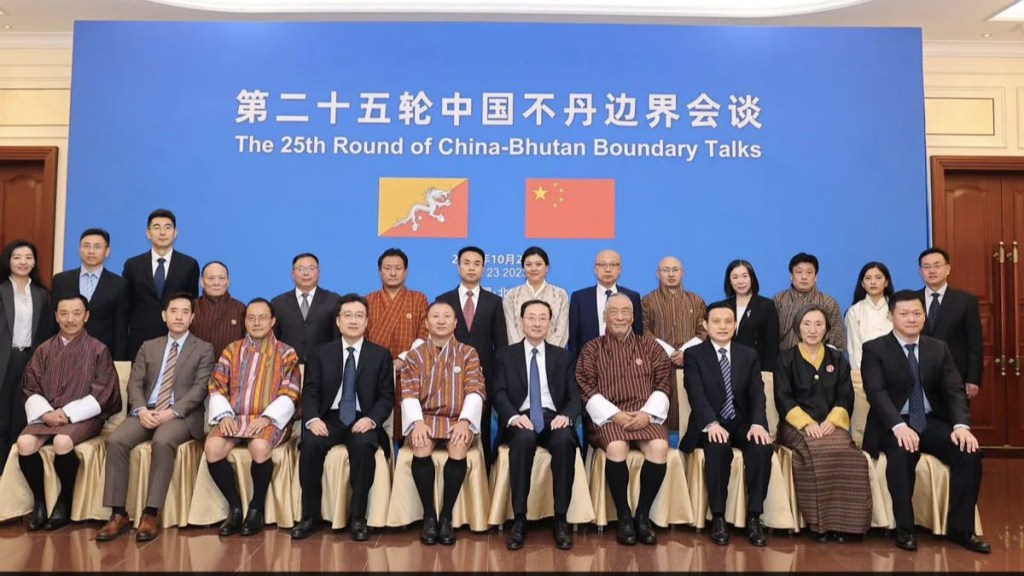Following their productive discussions at the 25th round of border talks, China and Bhutan inked a significant “Cooperation Agreement” that delineates the responsibilities and functions of the Joint Technical Team (JTT) regarding the demarcation and delimitation of their shared border.
On the sidelines of these border talks, Bhutan’s Foreign Minister Dr Tandi Dorji, currently visiting Beijing, engaged with Chinese Vice President Han Zheng on Tuesday and held discussions with Foreign Minister Wang Yi on Monday. During these meetings, they expressed a shared desire for Bhutan to establish diplomatic relations with China and promptly address the boundary matter, aiming to formalize their relationship.
The talks involved a comprehensive review of the boundary negotiations and the notable progress achieved through a series of Expert Group Meetings since the 24th Round of Boundary Talks in 2016, as stated in a joint press release by the Bhutanese Foreign Ministry.
A crucial outcome of the talks was the signing of the Cooperation Agreement between Bhutan and China, outlining the Responsibilities and Functions of the Joint Technical Team (JTT) assigned to the Delimitation and Demarcation of the Bhutan-China Boundary. The establishment of the JTT was a significant development stemming from the 13th Expert Group Meeting, aimed at facilitating the implementation of the Memorandum of Understanding (MoU) on the Three-Step Roadmap.
Both parties have resolved to continue their collaborative efforts in advancing the implementation of all steps within the Three-Step Roadmap, further cementing the positive momentum observed throughout the discussions.
The dialogue was characterized by a warm and amicable atmosphere, reinforcing the spirit of friendship and cooperation between Bhutan and China. Additionally, both sides explored opportunities to enhance bilateral relations and discussed matters of mutual interest, as highlighted in the press release.
Vice President Han emphasized that both China and Bhutan, as friendly neighbors, are committed to accelerating the boundary demarcation process and the establishment of diplomatic relations. He reiterated China’s respect for Bhutan’s independence, sovereignty, and territorial integrity, expressing a willingness to strengthen exchanges and cooperation in various fields to bring mutual benefits to both nations and their people.
Minister Dorji affirmed Bhutan’s dedication to the development of its relationship with China, firmly adhering to the one-China principle. Both sides share a strong determination to expedite boundary resolution and the establishment of diplomatic relations.
Furthermore, Foreign Minister Wang stressed the significance of restoring diplomatic ties, highlighting its alignment with the long-term interests of both countries. He expressed China’s readiness to work alongside Bhutan in realizing these objectives and consolidating their friendly relations in a formal and legal framework.
China and Bhutan, although lacking formal diplomatic relations, maintain regular contact through official visits. Notably, Bhutan’s boundary disputes with China are yet to be formally settled, making China’s efforts to establish full-fledged diplomatic ties with Bhutan all the more significant.
China’s prior attempts to construct a road in the Doklam plateau in 2017 resulted in a stand-off with India and tensions between the two neighbors. However, this issue was resolved when China abandoned its road-building plans.
In 2020, China made a claim on Sakteng Wildlife Sanctuary in Bhutan at the Global Environment Facility (GEF) Council, which prompted a demarche from Bhutan to the Chinese Embassy in India.
China has also intensified efforts to develop villages along its borders with India, Bhutan, and Nepal, focusing on infrastructure development and preferential policies.
The 13th Expert Group Meeting on the Bhutan-China Boundary issues, held in Beijing in August, was an important step in ongoing discussions.
This visit by Minister Dorji to Beijing follows Bhutanese Prime Minister Lotay Tshering’s remarks earlier this year, expressing hope for the speedy demarcation of territories with China. In light of these comments and to reinforce their strong ties, Bhutan’s King Jigme Khesar Namgyel Wangchuck visited India in April, where he met with Prime Minister Narendra Modi.
The discussions between Prime Minister Modi and King Wangchuck reaffirmed the trust, goodwill, and mutual understanding characterizing the relationship between India and Bhutan, particularly in the context of their shared interests, including security matters.
Tshering clarified that his statements regarding Doklam and the Bhutan-China boundary talks did not represent a change in Bhutan’s position.
During his meeting with Minister Dorji, Wang reiterated China’s commitment to neighborhood diplomacy and the principle of equality among all nations, regardless of size.
Dorji expressed Bhutan’s support for President Xi Jinping’s Global Security Initiative (GSI), the Global Development Initiative (GDI), and the Global Cultural Initiative (GCI), demonstrating Bhutan’s endorsement of China’s strategic initiatives.

